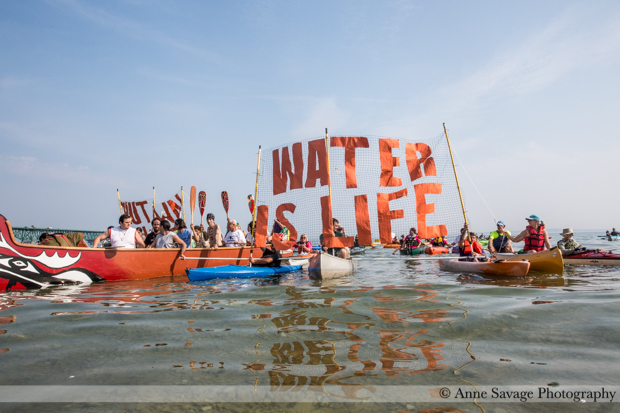
The following guest post was written by Denny Green from Clean Water Action – Michigan.
Enjoy
Protest of Enbridge Line 5 pipeline in Mackinac City, summer 2015, photo by Anne C. Savage
The U.S. Senate has just unanimously passed bipartisan legislation to reauthorize the Pipeline and Hazardous Materials Safety Administration (PHMSA) through 2019, and improve pipeline safety and oversight.
Introduced by U.S. Senator Gary Peters (MI), along with Senators Deb Fischer (R-NE), Cory Booker (D-NJ) and Steve Daines (R-MT), the legislation — Securing America’s Future Energy: Protecting Our Infrastructure of Pipelines and Enhancing Safety (SAFE PIPES) Act — includes several pipeline safety provisions from the Pipeline Improvement and Preventing Spills (PIPS) Act that Senators Peters and Stabenow introduced in September.
Peters, a member of the Great Lakes Task Force, has warned against the catastrophe of a Great Lakes oil spill, and the devastating effects it would spell for the 40 million people relying on the Great Lakes as their source for clean drinking water, not to mention the incalculable ramifications for Michigan’s environment and economy. The unanimous bipartisan support for this legislation is a long-awaited step in right direction.
“I look forward to working with my colleagues in the House to get this bill signed into law,” said Senator Peters. “We can advance safety standards, improve ice cover response plans, and better protect against the devastating impacts an oil spill would have on our waterways and our way of life.”
A few of the key provisions from Peters’ original legislation included in the SAFE PIPES Act are the designation of the Great Lakes as an “Unusually Sensitive Area”, making pipelines in the Great Lakes subject to higher standards for operating safely; the improvement of oil spill response plans to address ice cover, stipulating that the Pipeline and Hazardous Materials Safety Administration (PHMSA) and pipeline operators consider response plans addressing oil spill cleanup during periods of ice coverage; and the requirement that the Government Accountability Office (GAO) report on pipeline integrity management of natural gas and hazardous liquid pipelines, and critical reviews of the risks posed by age, condition, materials and construction of a pipeline.
Along with increasing the authorized funding levels for PHMSA (providing the agency with the necessary resources for conducting pipeline oversight) and offering provisions to streamline the hiring process to expedite hiring of qualified candidates for understaffed critical positions, the legislation also includes additional measures to improve storing hazardous materials, as well as encouraging the collaboration on research, development and technology between federal agencies, public stakeholders and industry leaders.
Senator Peters has long been a staunch proponent of enhanced pipeline safety standards for the protection of the Great Lakes. This year, the President signed the Coast Guard Authorization Act into law, with a provision from Senator Peters, requiring the Coast Guard to work with partner agencies including the National Oceanic and Atmospheric Administration (NOAA) to conduct an assessment on the effectiveness of oil spill response activities in the Great Lakes.



